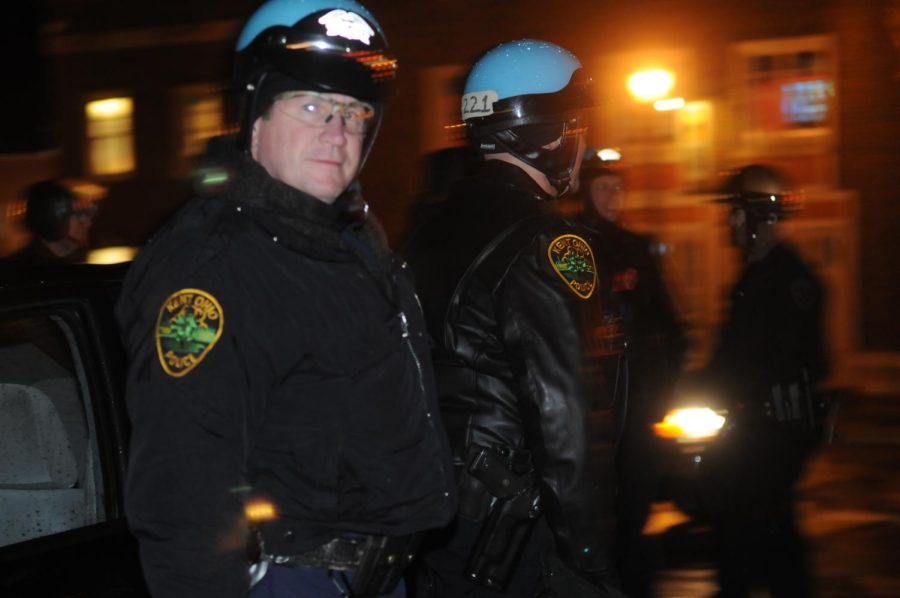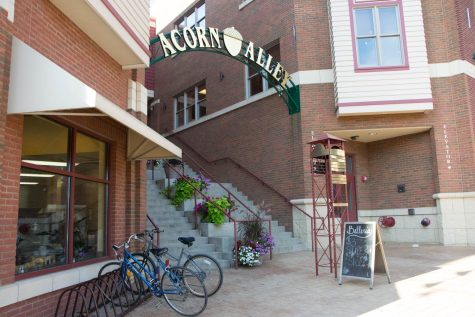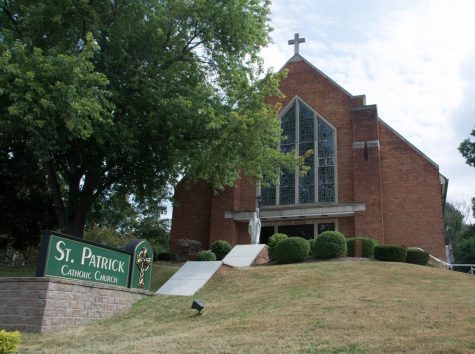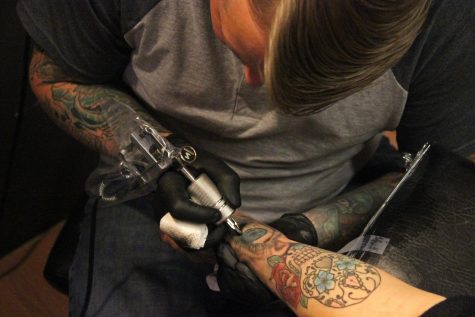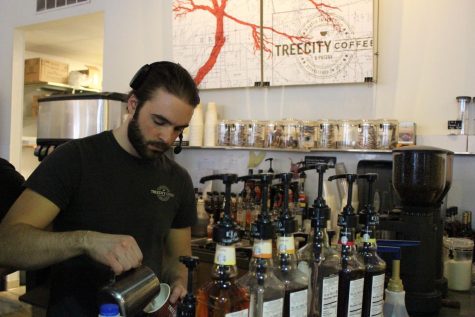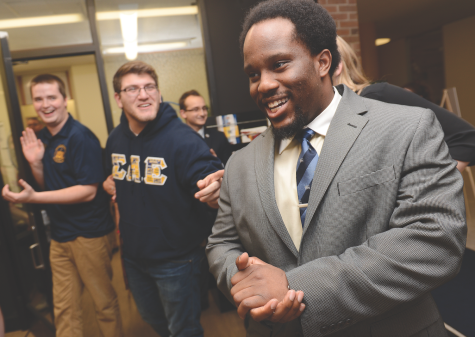Safety tips and tricks for Kent State students
August 27, 2015
On their own for the first time, away from parents and family in an unfamiliar place and surrounded by strangers — and hopefully soon-to-be friends — incoming students always ask, “Is this a safe school?”
In a single semester, students will meet new people, attend parties (on-campus or off) and have fun at least once, guaranteed.
But students also should be safe, and the university often promotes safety awareness. Incoming students should feel comfortable in an academic environment.
IN THE DORMS
With 25 residence hall locations on campus, the Department of Residence Services covers much of campus and student life. The dorms are where students often spend a large amount of time both studying and participating in social activities.
Each residence hall, unlike most academic buildings, is locked 24 hours a day with access available only to those students with a key card. Access cards, similar to hotel door keys, are given only to students living in the on-campus housing. Students will have access to their own door, the main door to the residence hall and the door to their hallway or elevator.
“Any person who doesn’t live in the residence hall is considered a guest,” said Jill Church, director of Residence Services. “If you don’t live there, you must be escorted.” There is no limit to the number of guests each student can have at one time, but Church said she knows students sometimes have big families or study groups in the halls.
Residence Services encourages students to lock his or her door at all times. Even if it’s convenient to leave it unlocked to walk down the hall, Church said it’s important for students to keep safety in mind.
Each residence hall floor is staffed by a resident assistant ( RA) who patrols the halls and interacts with students living in his or her designated area. For the 2015-2016 academic year, nearly 150 RAs will be hired.
SECURITY AIDES
Besides the RAs, Residence Services offers a Security Aide program. For the 2015-2016 academic year, the university plans to hire 40-50 students to be employed as aides.
“The presence of security aides in the halls is intended to serve as a deterrent to crime and other problems.” according to the university housing website.
Each individual security aide is required to complete 100 hours of training each year. Aides are required to have training with the University Police Department, the fire safety department on campus and instruction about the general resources available to students.
The Student Security staff also provides an escort service for students who want to be escorted on campus from one point to another instead of walking alone across campus. Security escorts, who carry two-way radios to communicate with University Police, are available 8 p.m. to 2:30 a.m. Sunday through Wednesday, and 8 p.m. to 4 a.m. on the weekends, Thursday through Saturday.
The campus security page on the university website offers several tutorial videos, including how to fill out an incident report and file a maintenance request.
A.L.I.C.E. TRAINING
All incoming students are now required to complete A.L.I.C.E. training during his or her First Year Experience course. A.L.I.C.E. training sessions, which in years past have been optional, were implemented following a lockdown on campus in 2014.
A.L.I.C.E., an acronym for “Alert, Lockdown, Inform, Counter, Evacuate,” is a national crisis training program designed to teach people common sense techniques to use during active shooter situations.
Returning students who have not completed A.L.I.C.E. training can attend a workshop during the Spring 2016 semester.
Church said students are generally more aware of their surroundings. “We don’t want student to be fearful on campus,” she said. “We want them to be safe in their academic environment.”
CAMPUS POLICE
The Kent State University Police Department is fully accredited and has been the recipient of numerous national awards in recent years.
According to its website, the “award-winning” department is “one of the first nationally accredited law enforcement agencies in Ohio,” by the Commission on Accreditation for Law Enforcement Agencies (CALEA), and only the second university police force to be accredited in the nation.
Safety Phone Numbers
Campus Security escort services (330) 672-7004
University Police (Non-emergency): (330) 672-2212
University Police (emergency) 911
Fire Prevention Office: (330) 672-0831
Safety Threatline: (330) 672-SAFE (7233)
Porters Taxi: (330) 328-9029 (Call for rates)
1 Fast Transport Taxi: (330) 474-9411 (Rates $3 per person, $10 minimum)
With 32 full time officers on staff, including two K-9 units (if students haven’t met Coco or Dexter, the two police canines, it is highly recommended). The department also works with 4-6 auxiliary student officers each semester.
Community Resource Officer Tricia Knoles said the number one crime on campus is theft. Consistently during recent years, the department has seen the crime of opportunity in areas like residence halls and the Student Recreation and Wellness Center.
“Be aware of your surroundings,” Knoles said. “In the evening, walk with a friend or a group just to be safe.” She recommends students to lock his or her door, and to keep items stored in vehicles or lockers to be properly secured and out of sight.
Students should write down the serial number from his or her laptop in case it gets stolen, as well. Knoles said the department can run that info through a national database and track it down even if it leaves the state.
University police are also linked to the Flash ALERTS system. Officer Knoles said she recommends all students sign up for the free text messaging service, and also encourages parents to sign up, as well. “In case of a large incident on campus, it’s easier and quicker if parents know their child is safe instead of calling us,” she said.
Knoles also recommended students use the security aide escorts, who the department ensures are trained properly in “verbal judo” and non-physical techniques for disarming potentially violent situations.
If students encounter a criminal or violent situation on campus, he or she can utilize the campus Blue Light phone system. These devices, scattered across the campus, are linked directly to police dispatchers. If students dial 911 on their phones, those calls will be channeled directly to university police officers.
“Stay on the line,” Knoles said. “Even if it’s a miss dial, dispatchers will call back and continue to call to make sure the person is safe on the line.”
FIRE SAFETY
Kent State’s Fire Prevention Office works directly with the City of Kent Fire Department to “ensure the safety of individuals associated with the university community.”
The city, with assistance from Residence Service enforces all fire codes on university property. RAs are trained to inspect fire safety equipment in the residence halls, including fire extinguishers, pull alarms and smoke detectors. If a fire alarm is triggered on campus, the city fire department responds.
In years past, the most common cause of fires on campus relate to extension cords.
Fire drills are conducted once per semester, typically during the first month, and should be announced 24 hours in advance. When an alarm has been activated, automated instructions typically direct occupants of the building to the nearest exit.
As a matter of safety, the university lists several tips for students to utilize during a fire situation:
- If possible, and if it’s safe to do so, attempt to extinguish small fires. Then report the incident immediately to university police. If a student cannot extinguish a small fire, activate the nearest fire alarm pull station.
- Do not use elevators. Instead, use the nearest stairway and follow designated signs for exit routes. Do not run.
- Close doors behind you and turn off lights when you leave a room.
- Help any physically disabled individuals in your area.
- Move at least 75 feet away from the building.
- Do not re-enter a building with an alarm until told to do so by a university official, fire marshal or police officer.
TAXI SERVICES
Downtown Kent offers plenty of bars and restaurants to have a night on the town, and students will probably make friends who will invite him or her to a house party. Have fun, but be safe and don’t do anything illegal.
Area taxi services are available — for a fee — if students do not feel comfortable or are unable to get home safely. Local companies like Porter’s Taxi and 1 Fast Transport, as well as national services like Uber and Lyft, are only a phone call away.
LAB SAFETY
The university safety department also maintains all Material Safety Data Sheets in on-campus laboratories. MSDSs are reported to the state government to ensure the university is in compliance with state laws. Laboratory safety tips, including procedures for a chemical spill or hazardous waste disposal, are available on the university’s Compliance and Risk Management website.
SEXUAL ASSAULT
In 2013, the university created the Office of Sexual and Relationship Violence Support Services, or SRVSS, to provide resources for those affected by violent relationships.
Each academic year, the SRVSS office, in collaboration with the Women’s Center, also sponsors or hosts awareness and educational events like Walk a Mile in Their Shoes, Take Back the Night, One Billion Rising and the Clothesline Project.
In 2014, the SRVSS office began a campus-wide program call Green Dot. Designed to prevent assaults, the program aims to teach bystander strategies — moments of trouble that could be prevented by taking action to prevent an assault from occurring. For more information, students can attend one of three workshops SRVSS is hosting during the Fall 2015 semester.
SAFETY THREATLINE
Kent State offers an anonymous hotline for students who leave voicemail messages who want to report any kind of harassment, physical harm, suspicious behavior or individuals on campus, or report information related to criminal activity.
Students can call (330) 672-SAFE (7233) 24 hours a day, or submit an online form on the Department of Public Safety website.
OTHER SAFETY SERVICES
All students, both incoming and returning, can register for Flash ALERTS through the university’s website. This free text messaging system will send out period alerts related to fire alarms, building closings, threats on campus, and severe weather alerts such as tornado warnings.
Contact Matt Merchant at [email protected].


